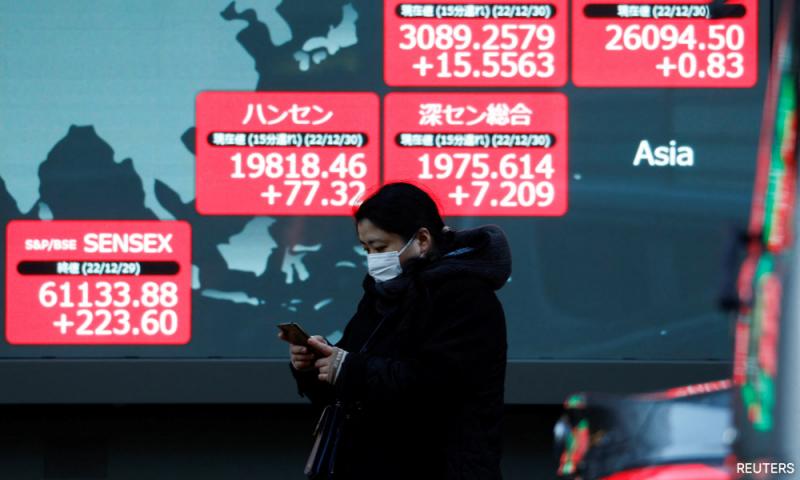Asia shares welcome China back, ready for rate hikes
Asian shares edged higher today into a week that is certain to see interest rates rise in Europe and the United States, along with US jobs and wage data that may influence how much further they still have to go.
Earnings from a who's who of tech giants will also test the mettle of Wall Street bulls, who are looking to propel the Nasdaq to its best January since 2001.
Asia has been no slouch either as China's swift reopening bolsters the economic outlook, with MSCI's broadest index of Asia-Pacific shares outside Japan up 11 percent in January so far at a nine-month high.
Early Monday, the index was up 0.2 percent, while Chinese blue chips climbed 1.3 percent after returning from the holidays.
Beijing reported Lunar New Year travel trips inside China surged 74 percent from last year, though that was still only half of pre-pandemic levels.
Japan's Nikkei added 0.3 percent and Taiwan 3.1 percent. S&P 500 futures and Nasdaq futures both eased 0.2 percent, while EUROSTOXX 50 futures dipped 0.1 percent and FTSE futures barely budged.
Investors are confident the Federal Reserve will raise rates by 25 basis points on Wednesday, followed the day after by half-point hikes from the Bank of England and European Central Bank, and any deviation from that script would be a real shock.
Just as important will be the guidance on future policy with analysts expecting a hawkish message of inflation is not yet beaten and more needs to be done.
"With US labour markets still tight, core inflation elevated, and financial conditions easing, Fed Chair Powell's tone will be hawkish, stressing that a downshifting to a 25bp hike doesn't mean a pause is coming," said Bruce Kasman, chief economist at JPMorgan, who expects another rise in March.
"We also look for him to continue to push back against market pricing of rate cuts later this year."
There is a lot of pushing to do given futures currently have rates peaking at 5.0 percent in March, only to fall back to 4.5 percent by year end.
Eyeing Apple
Yields on 10-year notes have fallen 31 basis points so far this month to 3.52 percent, essentially easing financial conditions even as the Fed seeks to tighten.
That dovish outlook will also be tested by data on US payrolls, the employment cost index and various ISM surveys.
As for Wall Street's recent rally, much will depend on earnings from Apple Inc, Amazon.com, Alphabet Inc and Meta Platforms, among many others.
"Apple will give a glimpse into the overall demand story for consumers globally and a snapshot of the China supply chain issues starting to slowly abate," wrote analysts at Wedbush.
"Based on our recent Asia supply chain checks we believe iPhone 14 Pro demand is holding up firmer than expected," they added. "Apple will likely cut some costs around the edges, but we do not expect mass layoffs."
Market pricing of early Fed easing has been a burden for the dollar, which has lost 1.5 percent so far this month against a basket of major currencies.
The euro is up 1.4 percent for January at US$1.0870 and just off a nine-month top. The dollar has even lost 0.7 percent on the yen to 130.10 despite the Bank of Japan's dogged defence of its uber-easy policies.
The drop in the dollar and yields has been a boon for gold, which is up 5.6 percent for the month so far at US$1,928 an ounce
China's rapid reopening is seen as a windfall for commodities in general, supporting everything from copper to iron ore to oil prices.
Brent was up 32 cents at US$86.97 a barrel, while US crude rose 26 cents to US$79.94.
- Reuters
RM12.50 / month
- Unlimited access to award-winning journalism
- Comment and share your opinions on all our articles
- Gift interesting stories to your friends
- Tax deductable

 Reuters
Reuters